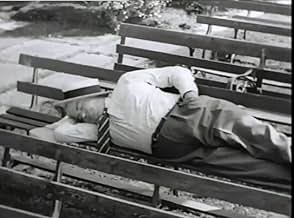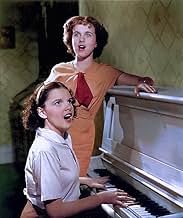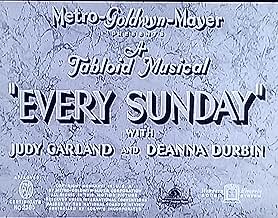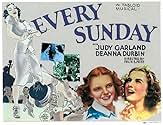Two teenage girls lend their fantastic singing voices to the cause when the city council threatens to replace the orchestra led by one girl's grandfather as the regular entertainment at the ... Read allTwo teenage girls lend their fantastic singing voices to the cause when the city council threatens to replace the orchestra led by one girl's grandfather as the regular entertainment at the Sunday concert-in-the-park series.Two teenage girls lend their fantastic singing voices to the cause when the city council threatens to replace the orchestra led by one girl's grandfather as the regular entertainment at the Sunday concert-in-the-park series.
Clem Bevans
- Man playing checkers
- (uncredited)
Jules Cowles
- Man in Audience
- (uncredited)
Paul Irving
- Mr. Bixby
- (uncredited)
Wright Kramer
- The Professor
- (uncredited)
Thomas Pogue
- Mr. Barfogle
- (uncredited)
Richard Powell
- Pop, Judy's Father
- (uncredited)
Kathryn Sheldon
- Woman Gotten out of Bath
- (uncredited)
Tammany Young
- Man Sleeping on Bench
- (uncredited)
- Director
- Writer
- All cast & crew
- Production, box office & more at IMDbPro
Featured reviews
In itself, this is a lightweight short feature with a predictable story, but it is well worth seeing as a pleasant part of cinema history. Seeing Deanna Durbin and Judy Garland together so early in their careers is a treat for anyone who has enjoyed their later pictures, and their energy and obvious talent more than make up for any lack of depth in the rest of the movie.
The plot is a simple one, with the two young women devoting themselves to saving a local concert series. What's interesting about it is seeing Durbin and Garland perform, since even at such a young age the difference in their styles is already pronounced. Deanna and Judy were both clearly ready for bigger opportunities.
This kind of feature probably doesn't hold an interest for a wide audience today, but for those who appreciate the classic musicals, it's worth seeing as a piece of movie history.
The plot is a simple one, with the two young women devoting themselves to saving a local concert series. What's interesting about it is seeing Durbin and Garland perform, since even at such a young age the difference in their styles is already pronounced. Deanna and Judy were both clearly ready for bigger opportunities.
This kind of feature probably doesn't hold an interest for a wide audience today, but for those who appreciate the classic musicals, it's worth seeing as a piece of movie history.
Every Sunday was basically made as a screen test for MGM execs to choose which prodigy they wanted to contract. Obviously, they chose Garland, and Durbin went on to great success for Universal in "Three Smart Girls".
I love this short film, and although it has no plot, it is interesting to observe the dueling divas sing their hearts out.
I love this short film, and although it has no plot, it is interesting to observe the dueling divas sing their hearts out.
Instead of making foolish comments praising one over the other (like comparing apples to oranges), fans of JUDY GARLAND and DEANNA DURBIN ought to just sit back and relax while watching this harmless little piece of musical fluff made simply to give audiences a look at two up-and-coming stars of the future.
Durbin's fans are insisting that she was the superior talent with the real singing voice and Garland fans are insisting that even then she was beautiful and sings up a storm on something called "Americana"--which, by the way, Garland does handle with finesse even though it's not even worthy of all her energies.
But both of them perform in a professional manner. Durbin's soprano voice is lovely and there's no reason for someone to complain that this type of voice "should not be coming from a child" of fourteen, instead of giving credit where it's due. It's obvious that she already had lots of vocal training and was already capable of handling operatic material and there's nothing wrong with that.
Judy too is in good voice, even though I personally think the studio could have chosen a more memorable song than "Americana" for her to belt out.
Anyway, together they blend nicely in a simple story about two girls who decide to do something when the local band concert is not attracting enough patrons to the park. They take matters into their own hands and come up with the idea of performing with the band as an added attraction. The stunt works and before you know it, they've attracted a good sized audience.
Audiences in '36 were probably pleased to see two such talented youngsters demonstrating their musical skills in a short film.
Durbin's fans are insisting that she was the superior talent with the real singing voice and Garland fans are insisting that even then she was beautiful and sings up a storm on something called "Americana"--which, by the way, Garland does handle with finesse even though it's not even worthy of all her energies.
But both of them perform in a professional manner. Durbin's soprano voice is lovely and there's no reason for someone to complain that this type of voice "should not be coming from a child" of fourteen, instead of giving credit where it's due. It's obvious that she already had lots of vocal training and was already capable of handling operatic material and there's nothing wrong with that.
Judy too is in good voice, even though I personally think the studio could have chosen a more memorable song than "Americana" for her to belt out.
Anyway, together they blend nicely in a simple story about two girls who decide to do something when the local band concert is not attracting enough patrons to the park. They take matters into their own hands and come up with the idea of performing with the band as an added attraction. The stunt works and before you know it, they've attracted a good sized audience.
Audiences in '36 were probably pleased to see two such talented youngsters demonstrating their musical skills in a short film.
Canthony is correct that this little short is just an excuse to hear a very young Judy Garland (fourteen years old!) singing with a slightly older (by one year) Deanna Durbin. But I must disagree with everything else he or she said, including the running time -- which is only about ten minutes, not twenty (a single-reeler).
The song is not her best, obviously; but it's enjoyable and definitely worth the ten minutes to watch on Turner. The duet with Durbin is quite interesting: two conflicting styles that nevertheless dovetail reasonably well.
The short is just a throwaway, but it's nowhere near as bad as the other reviewer made it out to be. Honestly, I enjoyed it.
Dafydd ab Hugh
The song is not her best, obviously; but it's enjoyable and definitely worth the ten minutes to watch on Turner. The duet with Durbin is quite interesting: two conflicting styles that nevertheless dovetail reasonably well.
The short is just a throwaway, but it's nowhere near as bad as the other reviewer made it out to be. Honestly, I enjoyed it.
Dafydd ab Hugh
It was 1936 and MGM had acquired both Judy Garland and Deanna Durbin. Both about the same age, a little too old for kiddie movies, not quite ready for romantic leads yet. Add in the fact the neither of the girls had much experience in front of the camera. What do we do with them? Risk it all prematurely on a big budget full length feature? Nope...you start them both off in one short, designed to showcase each girls individual talent (Deanna was already being groomed as the "operatic" one, Judy as the "hot swing jazz" singer). And pull together a plot that is merely an excuse for us to hear these girls sing. Both girls went on to success in movies, each with their own particular style, but this was a part of their education and we, luckily, get to see it today.
Did you know
- TriviaThis film was not (as is often reported) a "screen test" of sorts produced by MGM to help the studio decide which of these two girls, Deanna Durbin or Judy Garland, to keep under contract. Durbin was released by MGM and signed by Universal prior to this movie's production. A blurb on 1 June 1936 in "The Hollywood Reporter" stated "Universal had changed Canadian-born Edna Mae Durbin's name to 'Dianna' [sic]." This movie, it appears, was not produced until at least July 1936, by which time Durbin had already been signed by Universal and cast in her debut vehicle, Three Smart Girls (1936). The reason she appeared in this film was reportedly due to a provision in her MGM contract which entitled the studio to request her services for up to 60 days following its termination, provided she was not already shooting a film at her new studio. As filming on "Three Smart Girls" was not scheduled to begin until September 1936, Durbin found herself back at MGM making this short with Garland. This is why, although her on-screen character is called "Edna" in the short (Deanna's real name), in the credits she is billed under the name by which she would soon become internationally famous, "Deanna".
- GoofsWhen the girls are singing, their mouths do not always match the soundtrack.
- ConnectionsFeatured in That's Entertainment! (1974)
Details
- Release date
- Country of origin
- Language
- Also known as
- Каждое воскресенье
- Filming locations
- Production company
- See more company credits at IMDbPro
- Runtime
- 11m
- Color
- Aspect ratio
- 1.37 : 1
Contribute to this page
Suggest an edit or add missing content




























